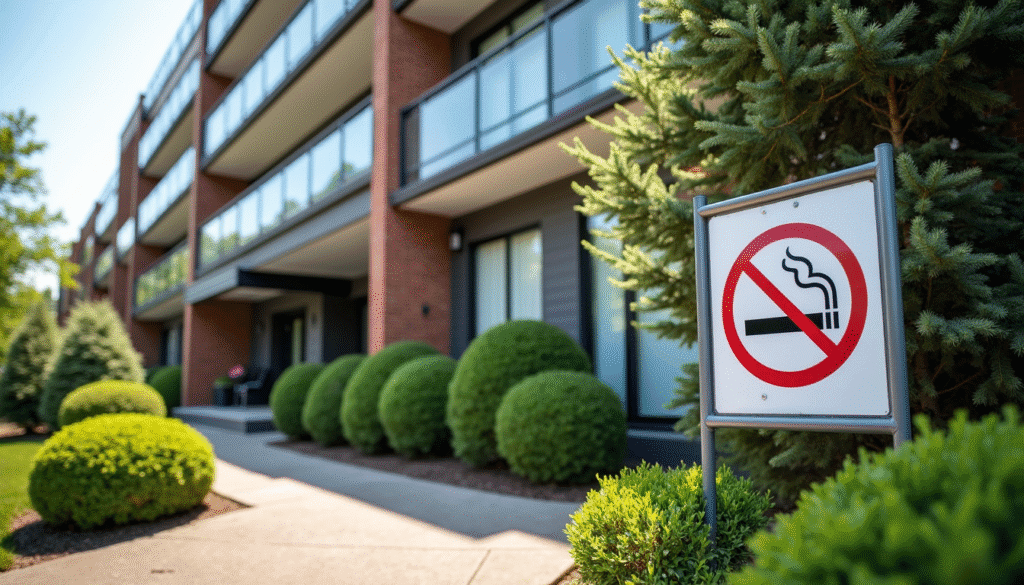As a landlord in Caldwell, New Jersey, you have solid legal grounds and strong health reasons to ban smoking in your rental properties. Whether it’s cigarettes, vaping, or cannabis, smoke damages property, raises insurance risks, and can alienate non-smoking tenants. Fortunately, New Jersey’s Smoke-Free Air Act and supportive local regulations make it easier than ever to enforce a no-smoking policy. This guide will walk you through why banning smoking is beneficial, what Caldwell and New Jersey law allows, and how you can update your leases to protect your investment — all while keeping tenants informed and cooperative.

Why Landlords Want a No-Smoking Policy
Health & Safety Benefits for Tenants
Secondhand smoke isn’t just an inconvenience — it’s a documented health hazard. According to the National Heart, Lung, and Blood Institute, exposure to tobacco smoke can trigger asthma attacks, worsen allergies, and contribute to long-term respiratory illnesses. In multi-unit buildings in Caldwell, smoke travels through ventilation systems, electrical outlets, and even tiny cracks, impacting neighbors who may never have chosen to be exposed.
Fire Risk and Insurance Considerations
Smoking is the leading cause of residential fire deaths in the United States. A dropped cigarette can smolder unnoticed, causing devastating fires that put tenants’ lives and your investment at risk. Many insurance providers offer reduced premiums for smoke-free buildings or charge more for properties that allow smoking due to the increased liability. A documented no-smoking lease clause can help protect you if a tenant-caused fire becomes an insurance claim issue.
Property Damage and Odor Remediation Costs
Nicotine stains walls and ceilings, damages flooring, and permanently embeds odors in HVAC systems. A typical move-out cleaning after a smoker might cost 2–3 times more than for a non-smoker. According to local property management data from RentShield’s guide on Garfield, NJ, landlords often have to replace carpets and repaint entirely. A no-smoking policy drastically reduces these turnaround costs.
Understanding NJ Smoke-Free Air Act & Local Laws
Statewide Regulations Overview
New Jersey’s Smoke-Free Air Act gives landlords the authority to designate residential properties as smoke-free. This means you’re fully within your rights to prohibit smoking inside individual units and common areas. Additionally, the law explicitly allows landlords to adopt stricter smoking rules than state minimums.
Municipal Authority in Caldwell
While Caldwell follows New Jersey’s statewide policy, local ordinances and your lease agreement are your primary tools. The town of Caldwell supports property owners in adopting smoke-free housing, and courts consistently uphold smoke bans when clearly written into a lease.
Steps to Implement a Smoking Ban
Review Existing Lease Agreements
Before you announce any changes, review your current lease. If your leases don’t address smoking, you typically must wait until renewal or sign an addendum agreed by both parties. The New Jersey Department of Community Affairs provides guidance on legal lease modifications and tenant notifications.
Drafting Clear No-Smoking Clauses
A strong lease clause explicitly defines smoking, bans it in all indoor areas, and often includes vaping and cannabis. Here’s a sample you might adapt (but always have an attorney review):
“This property is designated as smoke-free. Smoking, including but not limited to tobacco products, electronic cigarettes, and cannabis, is prohibited in all units, common areas, hallways, and within 25 feet of building entrances.”
For more wording samples, LawInsider offers common no-smoking clauses you can reference.
Updating the Lease at Renewal
The simplest approach is to implement the ban when leases come up for renewal. Provide ample notice, explain the reasons (health, safety, reduced costs), and reassure tenants it applies fairly to everyone. Under NJ law, you cannot change terms mid-lease without mutual agreement, so clear communication and incentives (like a cleaner building) help tenants accept the new policy.
Notifying Tenants and Posting Signage
Once your lease clauses are ready, send formal notices to tenants and install signage in common areas. This also helps enforce the policy legally. Signs that say “This Is a Smoke-Free Property” or “No Smoking Within 25 Feet of Entrances” make your rules visible and support your case if disputes arise.
Including Vaping & Cannabis in the Ban
In New Jersey, landlords are permitted to ban smoking of cannabis on their properties. The Property Owners Association of NJ notes that landlords have a clear right to restrict marijuana smoking, despite statewide legalization. You should explicitly include vaping (e-cigarettes) and cannabis in your smoking ban to avoid ambiguity.
New Jersey courts have supported landlords enforcing bans on cannabis smoking due to health concerns and property damage, provided your lease is specific. However, be mindful of medical use: while you can prohibit smoking forms, you may need to discuss reasonable accommodations, such as edibles or tinctures, under NJLAD (New Jersey Law Against Discrimination) if a tenant has documented medical needs.
For broader tips on no-smoking implementation, see our Garfield, NJ guide which offers more on local enforcement and best practices.
Next Up: Handling Tenant Push-Back & Accommodations
In the next sections, we’ll explore how to handle tenant objections, set up enforcement mechanisms, discuss designated outdoor smoking areas, and even highlight common FAQs from landlords across New Jersey.
Ready to learn more? Continue reading the full guide or contact RentShield Property Management if you’d like hands-on help drafting compliant leases or managing tenant transitions to a smoke-free policy.
Handling Tenant Push-Back & Accommodations
Even though New Jersey law is on your side when implementing a smoking ban, it’s perfectly normal to encounter concerns from tenants. Change — especially something affecting long-time personal habits — often meets resistance. You can expect questions like: “Why now?” or “What about guests who smoke?” Preparing thoughtful, empathetic answers will go a long way toward smoother adoption.
First, make sure tenants understand that a no-smoking policy is about more than personal preference; it’s about protecting everyone’s health and safety. You can reference resources like Tobacco Free NJ which highlights how secondhand smoke travels between units, impacting children, seniors, and people with asthma. This isn’t just theoretical — New Jersey’s Department of Health has found multi-unit housing has significantly higher airborne nicotine levels where smoking isn’t restricted.
When you roll out your new lease terms, offer a reasonable grace period for tenants to adjust. For example, you might announce the new rule now but make it effective at the next renewal, giving them several months to prepare. If you have long-term residents who smoke, consider personal discussions. Often they’ll appreciate the transparency even if they’re disappointed.
Addressing Medical Cannabis Situations
Under the New Jersey Law Against Discrimination (NJLAD), tenants with qualifying medical conditions using prescribed cannabis may ask for reasonable accommodations. This does not mean you must allow smoking — courts have generally supported landlords who restrict smoking due to health and fire risks, provided alternatives are offered. Examples include permitting edibles, tinctures, or vaporizers designed not to emit combusted smoke. You should never simply deny without discussing alternatives; show willingness to work toward a solution that avoids smoke exposure.
This cooperative approach not only strengthens your position legally but also fosters positive landlord-tenant relationships, reducing the risk of formal complaints or escalation to housing courts.

Enforcement & Penalties
How Lease Violations Work in New Jersey
Once your smoking ban is formalized in your lease agreements, it becomes enforceable just like rules against unauthorized pets or noise violations. If you discover a violation, New Jersey law typically requires you to give the tenant a written notice to cease the prohibited activity. This is often called a “Notice to Cease.” If the tenant violates the rule again after notice, you can issue a “Notice to Quit,” which starts the eviction process under New Jersey landlord-tenant law.
Consistent enforcement is critical. If you overlook a violation once, it may weaken your ability to enforce later. Always document with date-stamped letters, photos if there’s damage or evidence (like cigarette burns or odor), and keep copies in your tenant file. This protects you if the situation progresses to court.
Security Deposit Deductions
Another important aspect of enforcement is the final move-out inspection. If a tenant leaves behind smoke damage — such as nicotine stains on walls, yellowed ceilings, or lingering odors in HVAC systems — you’re typically allowed to deduct cleaning and restoration costs from their security deposit under New Jersey law. Just ensure you follow the required process: provide a detailed itemized list of damages and copies of invoices or estimates within 30 days of lease termination.

Remember, “normal wear and tear” doesn’t include smoke contamination. Courts consistently find that restoring a unit due to smoking goes beyond standard turnover, especially if remediation involves repainting multiple coats or replacing carpets to remove odors.
Designated Smoking Areas (Optional Strategy)
Some Caldwell landlords find it more practical to strike a balance by allowing smoking in clearly defined outdoor areas. This can dramatically reduce pushback from long-time smokers while still protecting indoor air quality and lowering your property risks. If you choose this path, it’s best practice to place designated smoking zones at least 25 feet from windows, doors, and air intakes to comply with best safety practices similar to those suggested by Tobacco Free NJ.
Be sure to update your lease to reflect this, for example:
“Smoking is strictly prohibited inside all units and building interiors. Smoking is only permitted in the designated outdoor smoking area as shown on the property map, and tenants must properly dispose of all cigarette butts.”
This clause helps you enforce the rule consistently and protects you from complaints that you’ve applied policies unfairly.
Adding benches or weather-proof ash receptacles encourages compliance and keeps the area clean. Many landlords who’ve tried this hybrid approach report fewer violations and greater tenant satisfaction.
Communicating with Tenants Effectively
Rolling out a no-smoking policy is as much about good communication as it is about lease language. When you announce the new rule, use a friendly yet firm tone. Your notice or email should cover:
- When the new rule takes effect (e.g., “at next lease renewal starting March 1”)
- What’s covered (all tobacco, cannabis, vaping inside units and common areas)
- Why you’re adopting it — safety, health, and protecting property value
- How violations will be handled under the lease
Offer to discuss any concerns in person or by phone. Many landlords include a short FAQ or even links to local smoking cessation resources like NJ Quitline. This shows tenants you care about their health and rights, not just enforcing rules. In our experience managing properties through RentShield, this supportive approach helps avoid defensive reactions and fosters a cooperative atmosphere.
Post clear signs in lobbies, hallways, and near entrances. This not only reminds tenants and guests of the rules but also strengthens your case if enforcement becomes necessary.
Examples from Other NJ Cities (e.g., Garfield)
It often helps to show tenants and investors that no-smoking policies aren’t new or unusual in New Jersey. For instance, landlords in Garfield, NJ — which faces many of the same multi-unit housing challenges as Caldwell — have successfully implemented smoking bans by clearly stating the rule in new leases, giving ample notice, and following consistent documentation practices. Our Garfield case study details exactly how they structured lease addenda, handled pushback, and enforced compliance without major tenant turnover.

Many property managers find that after an initial adjustment period, tenants actually appreciate the cleaner environment. Non-smokers often feel safer from secondhand exposure, while smokers adapt by stepping outside — especially when provided a designated area. A study by the National Multi Housing Council also found that 78% of renters prefer smoke-free housing, which means your Caldwell property becomes more attractive on the competitive market.
Using proven examples from nearby cities makes your case stronger. It shows your policy isn’t an outlier but part of a growing best practice among responsible New Jersey landlords.
Looking Ahead
Next up, we’ll answer the most common “People Also Ask” style questions from landlords across New Jersey — including exactly how to structure tenant notices, what to do if a tenant refuses to stop smoking, and ways to advertise your property as a premium smoke-free rental. We’ll also include a local resources section for Caldwell landlords so you can easily find lease templates, signage suppliers, and professional compliance help.
Want expert assistance drafting your new lease clauses or managing tenant transitions? Contact RentShield Property Management for a free consultation and learn how we help Caldwell landlords protect their properties with proven, court-tested no-smoking policies.
Common Questions Landlords Ask
Implementing a no-smoking policy in your Caldwell rental property brings up plenty of questions from both new and experienced landlords. Here are answers to the most frequent concerns we see, based on our property management experience across New Jersey.
Can I completely ban smoking in my rental property in Caldwell?
Yes. Under the New Jersey Smoke-Free Air Act, landlords have full authority to prohibit smoking inside rental units, in common areas, and even on the entire property if they choose. Your lease simply needs to state this clearly. Courts have consistently upheld these bans as long as they’re nondiscriminatory and uniformly enforced.
What if my current tenants already smoke?
If your existing lease doesn’t mention smoking, you’ll usually need to wait until renewal to add a smoking ban unless the tenant voluntarily signs an addendum. Many landlords roll out the new rule with ample notice so tenants aren’t surprised. Start discussions early, emphasize the shared benefits, and offer resources if they’re considering quitting. By contrast, for new tenants, you can make the smoke-free policy effective immediately on move-in since they’re agreeing to fresh lease terms.
Can I evict a tenant for smoking in NJ?
Yes — but only if your lease clearly prohibits smoking. If a tenant violates the lease, New Jersey law allows you to issue a “Notice to Cease.” If they keep violating it after that warning, you can follow up with a “Notice to Quit” and file for eviction. Documentation is key: keep copies of notices, photos of any damage or smoke evidence, and witness statements if needed. For more on the eviction process, check out resources at New Jersey Eviction Law.
Should I include vaping and cannabis in the ban?
Absolutely. Most modern no-smoking clauses explicitly mention vaping (e-cigarettes) and cannabis. While cannabis is legal in NJ, landlords maintain the right to restrict smoking on their property, including marijuana. Courts generally uphold these rules to protect other residents’ health and minimize fire risks. Just be sure to use lease language that specifically calls out “all forms of smoking, including tobacco, cannabis, vaping and e-cigarettes.”
Resources & Support for Caldwell Landlords
Want to see how other local landlords manage smoke-free housing? Or need legal templates and signage? Here are some of the best resources tailored for Caldwell and New Jersey property owners:
- Global Advisors on Smokefree Policy (NJ GASP) — legal toolkits, local success stories, sample multi-unit signage
- NJ Dept of Community Affairs — official guidelines on lease modifications and tenant notifications
- Tobacco Free NJ — info on designating smoke-free multi-family housing and supporting tenants
- RentShield’s Garfield guide — see how another NJ city handles smoking bans and lease enforcement
- RentShield contact page — if you want tailored compliance help in Caldwell
Leveraging these resources can save you hours of legal research and prevent costly mistakes, especially if you’re managing multiple units or multi-family properties.
Best Industry Practices
If you want your smoking ban to be enforceable, well-accepted, and minimize turnover, follow these proven best practices used by successful NJ landlords:
- Be specific in your lease: Don’t just say “no smoking.” Include tobacco, cannabis, vaping, e-cigarettes, and even details on designated outdoor areas if allowed.
- Use clear signage: Post signs at entrances, lobbies, hallways, and common areas. Courts often consider signage as proof of reasonable notice.
- Document everything: Keep copies of all notices, photos of units before and after move-out, and any communications about smoking violations.
- Offer reasonable timelines: Announce new rules well before lease renewal. Many landlords provide 60–90 days notice to existing tenants.
- Treat all tenants equally: Apply the policy to all residents and guests. Selective enforcement is the fastest way to lose a court case.
- Provide support resources: Share links to local quitlines or cessation groups to show you’re focused on health, not just penalties.
By following these steps, you make it easy to demonstrate that your policy is fair, reasonable, and designed to protect all tenants and your property investment.
FAQs About Marketing a Smoke-Free Property
Many Caldwell landlords ask if advertising “smoke-free housing” actually helps. The data says yes. According to the National Multi Housing Council, 78% of renters prefer non-smoking environments, and smoke-free units typically stay cleaner, require less frequent repainting or carpet replacement, and turn over faster. This means your property stands out on Zillow, Rent.com, or local listings — and you spend less on long-term maintenance.
Highlighting your property’s smoke-free policy in online ads and walkthroughs positions it as a healthier, well-maintained home, which appeals strongly to families, young professionals, and retirees alike.
Call to Action: Protect Your Property Today
Ready to draft a rock-solid lease or enforce your new no-smoking rules with confidence? Our team at RentShield Property Management specializes in helping Caldwell landlords navigate local ordinances, create bulletproof lease language, and communicate effectively with tenants to avoid disputes.
Don’t leave it to chance — a poorly written clause or inconsistent enforcement could cost you thousands in cleanup fees or legal challenges. Contact us today for a free consultation, and see how easy it is to protect your rental investment with a professional, court-tested no-smoking policy.
Image Alt Text Plan & Internal Linking Strategy
Throughout this guide, we’ve used images with alt text like:
- “Caldwell NJ apartment with no-smoking sign”
- “Landlord discussing lease changes with tenant”
- “Fire damage from tenant smoking in NJ apartment”
- “Outdoor designated smoking area in rental property”
- “Property manager explaining smoke-free policy in NJ”
These not only boost accessibility but also support SEO around “Caldwell NJ no-smoking rental policy.”
For internal links, continue connecting to related posts like:
This interlinks your authority content, keeps visitors on your site longer, and tells Google you’re a local expert in New Jersey landlord compliance.
Ready to Make Your Caldwell Property Smoke-Free?
Contact us today to get started with professional lease drafting, tenant notices, and enforcement support. Let RentShield Property Management help you keep your investment safer, cleaner, and more attractive to quality tenants.






